HOME >> OPINION,SPECIAL-COVERAGE
Head-of-state diplomacy can turn ties with US
By Zhang Tengjun Source:Global Times Published: 2019/6/24 18:48:40

File Photo: Xinhua
Amid the heat of the ongoing US-launched trade war against China, Chinese President Xi Jinping held a phone conversation with US President Donald Trump on June 18, at the request of the latter. The news that the two heads of state decided to meet during the G20 summit in Japan's Osaka has injected confidence into global markets, and the trade war apparently seems to have acquired a softer dimension.
In the past two years, the two leaders have met four times and talked more than a dozen times, mostly at vital junctures for bilateral relations. Whether it is to coordinate international and regional affairs or to negotiate and resolve bilateral issues of common concern, dialogue has promoted the realistic development of bilateral relations. Therefore, empirically, it is reasonable to expect the meeting in Osaka can let cool heads prevail in the trade conflict.
A closer look at the ups and downs of China-US relations since Trump took office has revealed that it is difficult to lie back before all is settled. One can derive comfort from the fact that after more than a month of deadlock in recent trade negotiations, the two countries finally resume talks, which could at least prevent relations from going further downhill, for high-level exchanges are stabilizers in ties between the economic titans.
The world today is undergoing major changes unseen in a century, but uncertainties linger. As the cornerstone of world stability, the role of China-US relations has become more prominent, and the pressing need to strengthen cooperation has further increased. However, there have been many difficulties in relations which are neither in the fundamental interests of the two peoples nor augur well for people around the world. Based on this, high-level exchanges should not only stabilize but also direct the future development of bilateral relations.
As Xi said in the telephone conversation that he stands ready to meet Trump in Osaka to exchange views on fundamental issues concerning the development of China-US relations, this is a very clear signal that no matter how strained the ties are, China is willing to talk frankly and sincerely with the US, because there are "a thousand reasons to make the China-US relationship work, and no reason to break it."
Noting that the first Xi-Trump meeting took place in Mar-a-Lago resort just two and a half months after Trump assumed office and affected China-US ties significantly, it is time for the two countries to demonstrate political determination to overcome current difficulties.
Currently, the biggest factor hindering the development of China-US relations lies in the Trump administration's China policy. Since China was clearly identified as a strategic competitor in the official US documents such as the National Defense Strategy, the Trump administration has ratcheted up attempts to contain China. However, such attempts haven't been influenced by fluctuations in the intensity of the trade war.
The Trump administration seemingly calls for a solution for the widening trade deficit, but essentially, its purpose is to change China's industrial policy and even its socio-legal system. As it is a demand for systemic change that China cannot agree to, the sooner the Trump administration understands this, the earlier can China-US relations be repaired.
The Trump administration's trade policy is to bring the other side to heel through maximum pressure and continuous persecution. However, the Trump administration has injected political and security factors into trade issues, and even caused divergences between China and the US in other fields, attempting to knock out the Asian powerhouse with a combination of blows. It is clearly a move that harms the opponent at its own expense, and the smart Trump should know the stakes.
The steady and sustained growth of China-US ties needs the foresight and sagacity of statesmen. The Chinese side has extended an olive branch by agreeing to a meeting of the presidents after a gap of six months. Trump should take the initiative to make the meeting more meaningful and constructive. Since a successful high-level meeting is the result of countless consultations between the two governments, there is every reason to make the positive outcome last longer.
The prime objective of the planned meeting between the two heads of state in Osaka is a truce in the trade war. If there is still a distance to go from reaching a trade agreement acceptable to both sides, it is advisable to set goals according to phases. Although the first half of 2019 has been turbulent for bilateral relations, the G20 summit in Osaka should be a turning point for breaking the ice in the second half of the year.
Since the establishment of China-US diplomatic relations in the past 40 years, bilateral ties have been bobbing up and down, bringing great practical benefits to the two peoples. The relationship may not completely return to what it was when bilateral ties were at their peak, but the key is to grasp the future. Regardless of perspectives, mutual benefits are indispensable to the development of the two countries. Head-of-state diplomacy will lay a solid foundation for development of bilateral relations. We look forward to success at the G20 summit and fruitful returns for both countries.
The author is an assistant research fellow at the China Institute of International Studies. opinion@globaltimes.com.cn
Posted in: VIEWPOINT,COMMENTS